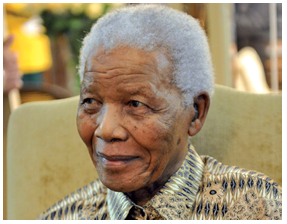Jul 2011
Jul 2011 Estelle Greeff
Better roads, more jobs
Better roads, more jobs sadmin“Many of our people will now get much-needed assistance in the form of EPWP projects. Some of the work opportunities include repairing and maintenance of roads...” - President Jacob Zuma, State of the Nation Address, 2011
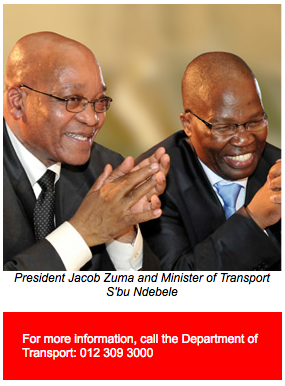 S'hamba Sonke - Moving Together is a massive job creation drive to fix, upgrade and maintain South Africa's entire secondary roads network. Launched by Transport Minister Sibusiso Ndebele earlier this year, the programme will create new opportunities for jobs and emerging contractors throughout the country. In partnership with all the provinces, it will repair potholes and improve access to schools, clinics and other social and economic opportunities.
S'hamba Sonke - Moving Together is a massive job creation drive to fix, upgrade and maintain South Africa's entire secondary roads network. Launched by Transport Minister Sibusiso Ndebele earlier this year, the programme will create new opportunities for jobs and emerging contractors throughout the country. In partnership with all the provinces, it will repair potholes and improve access to schools, clinics and other social and economic opportunities.
The S'hamba Sonke - Moving Together programme is a new and innovative, nationwide drive to focus on the maintenance of secondary road infrastructure using labour-intensive methods of construction and maintenance. The programme sets out to create 70 000 jobs this year and a total of 400 000 jobs by 2014.
Government has set aside R22,3 billion for the project, broken down as follows: R6,4 billion in 2011/12, R7,5 billion in 2012/13 and R8,2 billion for 2013/14.
Zimbambele
“The jobs created during 2011 is a target in relation to the routine maintenance of roads and infrastructure in line with the Zibambele initiative,” said Minister Ndebele.
Zibambele, which means “doing it ourselves”, is a routine road maintenance project which started in KwaZulu-Natal, using labour intensive methods. It is contracted to a family or household, through a provincial department, to maintain a specific length of road on a part-time basis.
The national roll-out of Zibambele will form part of S’hamba Sonke - Moving Together.
International benchmark
Previously South Africa has invested mainly in the building of roads without striking a balance between maintenance and construction.
The international benchmark is a 60/40 split between maintenance and construction. Through programmes such as S’hamba Sonke - Moving Together, South Africa will be able to match the international benchmark.
Patching potholes
S’hamba Sonke includes a massive pothole-patching programme throughout the country. A national pothole hotline will also be launched for road users to report potholes anywhere.
This will help to arrest the decline of infrastructure while creating thousands of much-needed jobs.
Roads engineers
Roads engineers and superintendents will be deployed all over the roads network to deal with potholes and infrastructure maintenance.
This will include driving through stretches of road every morning to determine the condition of roads. Potholes will thus be identified and repaired before they become dangerous to motorists.
Letters to the Editor - Give us a piece of your mind
Letters to the Editor - Give us a piece of your mind sadminWinning letter - Respect your job
 My heart bleeds when I see our brothers and sisters neglecting their jobs. People tend to forget what motivated them to apply for a job in the first place and when they are employed everything seems to be forgotten. It seems that when they enter the work environment, they don’t care about their work. They tend to start neglecting their duties and concentrate on negative things, such as office gossip.
My heart bleeds when I see our brothers and sisters neglecting their jobs. People tend to forget what motivated them to apply for a job in the first place and when they are employed everything seems to be forgotten. It seems that when they enter the work environment, they don’t care about their work. They tend to start neglecting their duties and concentrate on negative things, such as office gossip.
People should start changing their attitudes towards life. Many people don’t have jobs, so I would like to encourage everyone who has a job, irrespective of whether it is permanent, part-time or a casual job, to hold on to that job and respect what you have.
- Mholo Fikile, Heilbron, Free State
We would like to hear from you
If any of the information published in Vuk’uzenzele has helped you in any way to improve your life, we would love to hear all about it. For example if Vuk’uzenzele has motivated or helped you to start your own business, getting a bursary or a job, please tell us how we have helped you. Don’t forget to include your telephone or cellphone number and address.
Make Vuk'uzenzele more accessible
I am young and still trying to build a bright future, but without important information that comes out of Vuk’uzenzele, I think I wouldn’t be able to build my future. I was surprised to see that inside this magazine there is a lot of important information that one could use, like, for example, for bursaries. So I think if you could make it more accessible to everyone, it will help more youth of this country to realise their dreams.
– Tshilo Ben Matsinyane, Botshabelo, Free State
Change or be changed
At the beginning of each year, people set goals, which some call “New Year’s resolutions”. Success has nothing to do with years. It is us who must change the years and not let the years change us. There are three groups of people; the first is the group of those who “make things happen”, the second “watch things happen”, and the third group “do not even know that there is anything happening”. We must be the ones who will implement strategies of change in our lives and if there are no strategies we will fall into tragedy.
– Siphosihle Mzongwana, Brown's Farm, Western Cape.
No more rude taxi drivers
The bad boys of the road, taxi drivers, are to be reformed. Thanks to the Minister of Transport for giving the taxi associations a code of conduct for drivers, as well as passengers to improve the image of the taxi industry. Taxi drivers have always been unpopular with commuters and private motorists for reckless driving and being rude. Let us hope that the code of conduct will end fights between passengers and drivers and other motorists will enjoy driving.
– Emily Mathe, Sisulu Park, Free State
Hide your firearm
IIt is very important to hide your firearm, no matter who you are, unless you are on duty like a police officer, traffic police, correctional officers, SANDF or security officers. Use your firearm properly and hide it when you’re off duty. Never show it off, because you can endanger your own life and that of other innocent people. Criminals need your firearm to destroy the nation. Let’s help SAPS to take illegal firearms from criminals.
– Mfanafuthi Jele, Madadeni, KZN
Send your letters to:
Vuk'uzenzele, Private Bag X745, Pretoria, 0001, or e-mail: vukuzenzele@gcis.gov.za.
If you don’t want your real name published you may use a different name, but please include your real name and address.
Please note:
To win a prize you must include a physical address and a contact telephone number.
Prizes that re not claimed within 90 days of publication, will be forfeited.
To win a prize you must include a physical address and a contact telephone number.
Prizes that re not claimed within 90 days of publication, will be forfeited.
Doing it ourselves
Doing it ourselves sadminThe S’hamba Sonke - Moving Together road construction and maintenance programme has been modelled on the successful KwaZulu-Natal-based Zibambele Road Maintenance Contract System.
Zibambele, which means “doing it ourselves” was started in 1999 by the KwaZulu-Natal Transport Department as a poverty-relief project under the Expanded Public Works Programme (EPWP).
Its main aim is to provide work opportunities for rural households headed by women. It currently employs 40 000 contractors, the majority of whom are women.
Rural roads
The objective of the project is maintenance of approximately 1 200 km of rural roads. Activities include cleaning of the road surfaces and edges and clearing of drains and channels.
Each woman-headed household is tasked with the maintenance of a specific length of community access road in the rural areas where they live.
Kamoso Awards
The project has won a Kamoso EPWP Award for four years in a row. The Kamoso Awards is an annual event of the Public Works Department to recognise excellence in the carrying out of EPWP projects.
Savings Club
The 12-year old road-maintenance project has also seen the formation of Zibambele Savings Club programme through which contractors organise themselves into savings clubs. To date, they have collectively saved more than R6 million.
New technology speeds up TB testing
New technology speeds up TB testing sadminSouth Africa is still one of the countries in the world with the highest incidence of TB. This is made worse by the high rate of people who are infected with HIV. HIV weakens the immune system, which increases the risk of TB.
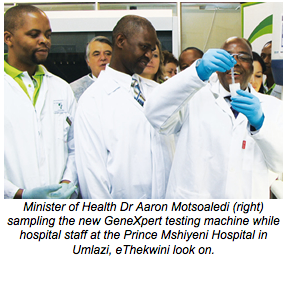 Tuberculosis patients in KwaZulu-Natal will no longer have to wait three weeks for TB test results. Government recently unveiled new TB testing equipment called the GeneXpert. Currently, it takes at least three weeks to confirm the results of TB tests, but the new machine will make results available within two hours.
Tuberculosis patients in KwaZulu-Natal will no longer have to wait three weeks for TB test results. Government recently unveiled new TB testing equipment called the GeneXpert. Currently, it takes at least three weeks to confirm the results of TB tests, but the new machine will make results available within two hours.
An unveiling ceremony of the GeneXpert was held at the Prince Mshiyeni Hospital in Umlazi, south of Durban, recently. Health Minister Dr Aaron Motsoaledi urged all South Africans to work together with the department to ensure that the country’s TB burden is reduced. This new technology will assist the department in reducing the time patients have to wait before getting their results. The new technology is one of only five such machines in the whole world. The department is currently working on a national roll-out plan that will see more of these machines being distributed.
The first GeneXpert has been launched in eThekwini, KwaZulu-Natal because the district has the highest number of TB cases in the country. In addition to the new roll-out plan the department is also building public awareness with the “Kick TB Campaign” which aims to involve learners in the fight against TB and promote healthy lifestyles.
Stepping up the TB fight
Stepping up the TB fight sadminA R40 million Multi-Drug Resistant (MDR) tuberculosis facility has been unveiled in the North West Province to help strengthen the TB cure rate in that province.
TB in the North West accounts for more than a quarter of deaths, while HIV-related illnesses account for 60 percent of deaths at the Klerksdorp/Tshepong Hospital complex. The current MDR TB cure rate in the province is 65 per cent, while the Extreme Drug Resistant (XDR) cure rate is at 16,1 per cent.
Extra beds
The expansion of the MDR TB Unit at the Tshepong Hospital in Jouberton was unveiled by Provincial Health MEC Dr Magome Masike, where 40 extra beds have been placed in the unit.
The TB facility consists of an XDR unit catering for patients across the province and remains a pillar in the fight against TB. The province has 55 MDR in-patients and 419 outpatients, with only eight XDR in-patients. According to departmental spokesperson Tebogo Lekgethwane, MDR and XDR TB develop when patients don’t complete their prescribed treatment. This remains a main concern for the department.
Door-to-door
“Treating MDR/XDR TB is very costly as compared to treating ordinary TB patients. This puts a huge strain on the department, given the numerous and complex public health challenges it is facing,” said Lekgethwane.
The department has also stepped up efforts to reach communities through door-to-door visits and public places such as taxi ranks.
For more information, call the Department of Health: 012 395 8000
Revitalising nursing
Revitalising nursing sadminNurses are at the heart of the country’s health system and play an important role in delivering an effective healthcare service. There is growing public concern in about the declining quality of healthcare, particularly nursing in the country. By uplifting and revitalising the nursing profession it will be possible to increase the population’s life expectancy, reduce the deaths of mothers and babies, decrease the spread of HIV/AIDS and TB, and improve the health system.
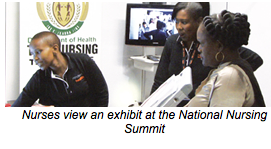 In April, the Minister of Health, Dr Aaron Motsoaledi, hosted a National Nursing Summit to address these issues early. President Jacob Zuma delivered the keynote address to over 2 000 nurses and stakeholders and called the summit “a moment of renewal for the nursing profession”. The summit discussed ways to improve the nursing profession and resulted in a Nursing Compact, which will help to restore the dignity and professionalism of nurses. The compact will focus on improving service delivery, especially at primary healthcare level, through standardising the education and training of nurses, improving assistance to nursing students (funding, accommodation, improved learning environments), elevating public nursing education and training institutions to the level of higher education institutions, and improving clinical facilities.
In April, the Minister of Health, Dr Aaron Motsoaledi, hosted a National Nursing Summit to address these issues early. President Jacob Zuma delivered the keynote address to over 2 000 nurses and stakeholders and called the summit “a moment of renewal for the nursing profession”. The summit discussed ways to improve the nursing profession and resulted in a Nursing Compact, which will help to restore the dignity and professionalism of nurses. The compact will focus on improving service delivery, especially at primary healthcare level, through standardising the education and training of nurses, improving assistance to nursing students (funding, accommodation, improved learning environments), elevating public nursing education and training institutions to the level of higher education institutions, and improving clinical facilities.
Other issues that will be addressed are practical nursing experience, the nurses’ pledge, attitudes, financial incentives, alignment of salaries, recognition of prior learning, career development, nursing agencies, filling of vacant posts and a return to the standardised white uniform
Putting a stop to a social evil
Putting a stop to a social evil sadminEvery year, thousands of people are trafficked into South Africa and sold into forced labour or prostitution. This is seen as slavery. Several government departments are presently working together on a massive awareness campaign to stop this social evil.
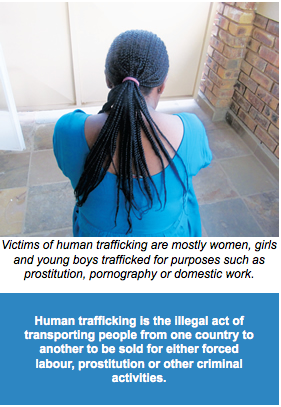 Human trafficking is driven by networks situated in source countries with links to South Africa as destination. Perpetrators and intermediaries include large organised-crime networks.
Human trafficking is driven by networks situated in source countries with links to South Africa as destination. Perpetrators and intermediaries include large organised-crime networks.
Government departments, including Social Development, Justice and Constitutional Development, Home Affairs, Police, the National Prosecuting Authority and the Women, Children and People with Disabilities are working with non-governmental organisations to fight human trafficking. These include the International Organisation for Migration (IOM).
False job offers
The victims of human trafficking are normally forced to work as slaves in foreign countries. These people accept attractive job offers in other countries without knowing that these offers are false.
When they arrive in the countries where the jobs are said to be, they are forced into prostitution or labour with little or no pay. The people who get money are the traffickers or the people who brought them to those countries under false promises.
Women, children and boys
Women victims of human trafficking are usually violently abused and made to repay large sums of money to their traffickers, according the Justice Department. Their travel documents like passports are taken away from them so that they cannot escape.
Because of economic opportunities, South Africa is the destination of choice for most human traffickers. Victims of human trafficking are mostly women, girls and boys trafficked for a variety of reasons including prostitution, pornography or domestic work. Young boys are also used to smuggle drugs and for other criminal activities.
Routes
People are mainly trafficked into South Africa from Thailand, the Philippines, India, China, Bulgaria, Romania, Russia and the Ukraine. Within Africa, they are mostly from Mozambique, Zimbabwe, Malawi, Swaziland and Lesotho, but also from the Democratic Republic of Congo (DRC), Angola, Rwanda, Kenya, Cameroon, Nigeria and Somalia.
Measures that government has put into place include the Prevention and Combating of Trafficking in Persons Act.
During the 2010 FIFA World Cup, government, through the Department of Home Affairs, took steps to protect victims of human trafficking and arrest the perpetrators.
Places of safety
Victims of human trafficking are placed in places of safety to help them lead normal lives. They are asked to give information, if they are willing to do so, to help track down and take steps against perpetrators. With the help of embassies, steps are also taken to return foreign nationals who are victims of trafficking safely to their countries.
Building a united front against crime
Building a united front against crime sadminThe KwaZulu-Natal Department of Community Safety and Liaison is stepping up its fight against crime. The Building a United Front Against Crime programme aims to fight crime within communities by involving individuals and community leaders. The department will drive this programme as a priority for the next four years.
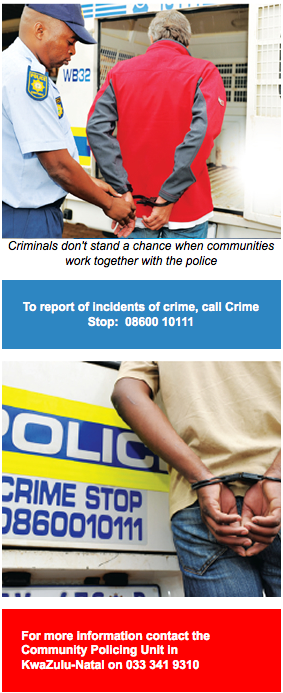 Safety and security has been identified as one of government’s key priorities. To strengthen the fight against crime, government is combining different methods of preventing and reducing crime.
Safety and security has been identified as one of government’s key priorities. To strengthen the fight against crime, government is combining different methods of preventing and reducing crime.
Take responsibility
The purpose of the Building a United Front Against Crime programme is to raise awareness about the role that each individual can play within a community. The programme encourages people to work with government in its efforts to ensure crime-free, safe communities throughout the country.
Many criminals live in homes within communities. They work, go to school and operate criminally in these very same communities. The project helps communities root out criminal activities by encouraging people to take responsibility.
Report criminal activities
Community members should be aware of what is going on around them and should report criminal activities within their communities instead of ignoring them.
The programme has implemented Community Policing Forums (CPFs) in all community districts, as well as established community safety forums.
If residents, schools, community and religious organisations work together and communicate with their local police units, criminals won’t stand a chance within united communities.
Volunteer jobs
The programme also increases community participation and has created safe recreational facilities within communities. It has also created job opportunities for volunteers and CPF members.
Improving performance
Improving performance Estelle GreeffThe Department of Basic Education introduced annual national assessments (ANA) in Grades 1 to 6 in 2008 as part of the Foundations for Learning campaign. The campaign aims to improve learners’ performance, as well as the overall quality of education.
In 2009, more than 90 per cent of schools participated in the national assessments in the form of written tests. In addition to assessing Grades 1 to 6, language, mathematics and science was assessed in Grade 9.
A national standard
The Department has set a target to improve learners’ achievements by 2014. This includes improving numeracy and literacy levels of Grades 3 and 6. Currently, the average levels of numeracy and literacy in the country are between 27 and 38 per cent. The department aims to reach at least 60 per cent by 2014. There will be national assessments for Grades 3 in literacy and numeracy and for Grade 6 and 9 in languages and maths every year. A national standard will be set to provide a benchmark for all schools in the basic education sector.
The national assessments aim to improve the quality of education. The results will help the Department of Basic Education to track and improve the quality of learning and teaching in the system. Teachers will now be exposed to better learner assessment techniques.
Schools that are unable to reach their targets will receive special support.
Who will write the ANA tests?
Each child will write two tests, namely a literacy and a numeracy (maths) test. The tests will be based on the performance levels from the previous year:
In the Foundation Phase (Grades 1 to 3) learners will write the national assessment in their home language. This will be one of the 11 official languages.
In the Intermediate Phase (Grades 4 to 6) learners will write the tests in one of the languages of learning and teaching which is English or
Afrikaans.
In the Senior Phase only those learners who were in Grade 9 in 2010 and who are now in Grade 10 will write the national assessment as a pilot project. 50 schools in each province have been selected to participate.
Schools will release the assessment results as soon as possible in February each year. Parents will be informed and schools and teachers will use the results to plan for the school year.
How to prepare for ANA
Each year, schools will receive examples of ANA literacy and numeracy tests so that schools and parents can help learners prepare for the tests every February.
The ANA timetable and examples for 2011 can be found on the Department’s website at www.education.gov.za
It is very important that parents encourage their children rather than put pressure on them. Parents should build up their children’s confidence so that they will believe in their own abilities. Children should understand that the ANA tests are not examinations in which they can pass or fail. It is a way to find out if they have any problems with literacy and numeracy and how they can be helped.
Parents should encourage their children to read as much as possible at home, whether it’s newspapers or magazines or books.
You can help your children by:
- taking them to your local library
- encouraging them to read and take out books regularly
- teaching them to respect and treat books with care.
- The Department of Basic Education is distributing workbooks for literacy and numeracy to all learners in Grades 1 to 6. They will be encouraged to take their workbooks home. Check your children’s workbooks and ask them questions about what they are learning in class. Ask your children whether they are aware of the tests and when they will write them. You may access the examples for Grade 3 and 6 on the Department of Basic Education’s website: www.education.gov.za.
Blazing a wine trail
Blazing a wine trail sadminSouth Africa is well-known for its excellent wines, which are mostly produced in the Western Cape. In future, however, when you enjoy a glass of wine with your meal, it could be produced from grapes grown in KwaZulu-Natal. A group of rural women in the province are blazing a trail in wine-making.
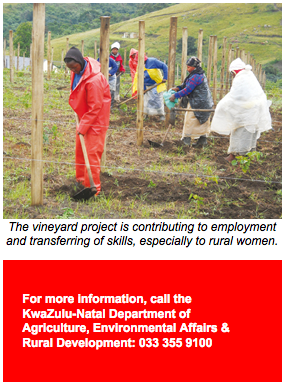 The growing of grapes and production of wine in KwaZulu-Natal follows an R8 million injection from the provincial Cooperative Governance and Traditional Affairs’ Corridor Fund for a pilot vineyard project in the iLembe District Municipality on the North Coast.
The growing of grapes and production of wine in KwaZulu-Natal follows an R8 million injection from the provincial Cooperative Governance and Traditional Affairs’ Corridor Fund for a pilot vineyard project in the iLembe District Municipality on the North Coast.
With its seat in KwaDukuza (formerly Stanger), the iLembe District has four local municipalities under its wing. These are KwaDukuza Municipality (incorporating former Stanger, Ballito, Shaka’s Rock, Zinkwazi), Mandeni Municipality, Ndwedwe Municipality and Maphumulo Municipality.
Wine infrastructure
The overall plan of the project is to further develop the infrastructure for the wine industry within the iLembe District by establishing a winery and its related operations. Called iLembe Vineyards, the project was proposed by The Stables Wine Estate to Enterprise iLembe, the district municipality’s trade and investment promotion agency. The Stables Wine Estate, based in Nottingham Road in the Midlands, is the first wine estate in KZN and one of the newest wine regions in South Africa.
First crops
In September last year, the first crops were planted on 11 hectares in three sites in Maphumulo, KwaDukuza and Ndwedwe as part of the Phase 1 of the project.
About 70 permanent and 35 seasonal jobs have been created during Phase 1 of this project with more job opportunities expected as the project grows.
The aim of the iLembe Vineyards project is to plant and harvest vines with the intention of producing wine, brandy, juice and table grapes.
The vineyards are expected to produce up to 25 tonnes per hectare of top quality grapes for producing selected products. The project will develop the Villard Blanc cultivar as a ‘wine of origin’ in iLembe’ and so establish a brand for the region.
Community benefits
The Ilembe District municipality remains the owner of the project. Funding has been granted on the basis that the community will benefit and this benefit will grow through proposed community trusts on the project sites.
Workers’ co-operatives benefit financially during the preparation and crop care stages.
“There is enormous potential for the wine industry in this province. Never before have all the elements been so perfectly poised to allow a new industry with such enormous benefits been perfectly aligned as we have currently in KwaZulu-Natal,” said Judy van Niekerk of The Stables Wine Estate.
Growing demand
With international interest in KwaZulu-Natal because of the new King Shaka International Airport and the Dube Trade Port, there is growing demand for South African wines traditionally from the Cape and the new KwaZulu-Natal Wines.
KZN takes the cup with chicory
KZN takes the cup with chicory sadminCommunal farmers in the KwaZulu-Natal Midlands are set to benefit from supplying chicory to a multi-national coffee maker. The chicory supply project in Weenen outside Estcourt started in 2008. The Swiss multi-national company, Nestlé, started it to improve the production of local chicory to supply its coffee-making plant in nearby Estcourt.
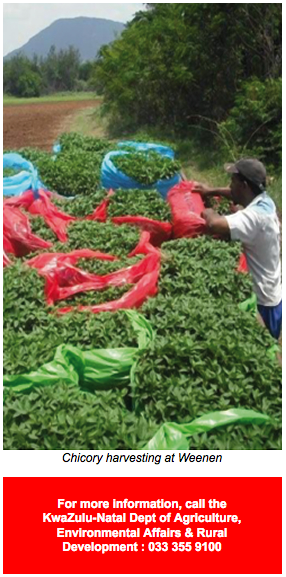 The public-private partnership involves Nestlé, communal rural farmers from Weenen and the KwaZulu-Natal Provincial Government.
The public-private partnership involves Nestlé, communal rural farmers from Weenen and the KwaZulu-Natal Provincial Government.
In line with the Government’s Land Redistribution Policy and Broad Based Black Economic Empowerment (BBBEE) programme, the chicory project centres on farms owned by black farmers whose ancestral land had been returned to them through the land restitution programme.
KwaZulu-Natal Premier, Dr Zweli Mkhize, has praised the public-private partnership as the chicory project will go a long way in reviving economic activities and creating jobs in small rural towns such as Weenen and Estcourt.
Local chicory
Until 2003, Nestlé was getting its supply of chicory to its South African business from one supplier. However, price increases led to the coffee manufacturer importing 80 per cent of its chicory from India at a lower cost.
With India increasingly exporting its chicory to Europe, Nestlé realized that the price of imported chicory would increase too. Therefore, Nestlé South Africa started a project to improve the production of local chicory. The areas selected were close to Nestle’s Estcourt factory, which uses chicory in one of their coffee brands. This has ensured that the project supply an established market and create additional employment opportunities.
Planting season
The first large-scale trials on the chicory project started in late 2008. During these trials, the focus was on finding willing farmers as well as understanding the nature of local diseases and pests, and recording water absorption, soil type and climate.
The first planting season was in 2009 with 13 communal farmers planting 19 hectares. Last year, about 440 tonnes of raw chicory produced 90 tonnes of roasted chicory at Nestle’s Estcourt Ricoffy coffee factory.
Processing plant
During this financial year, Nestlé expects to produce 505 tonnes of roasted chicory from 70 hectares, rising to 565 tonnes from 120 hectares in 2012 to 2013. A processing plant is already being built at Estcourt and local farmers together with Nestlé will share ownership of the plant that will be processing the raw chicory.
The KwaZulu-Natal Economic Development Department has committed itself to continue supporting the chicory project.
The engine driving KZN economy
The engine driving KZN economy sadminIn response to President Jacob Zuma's call to make 2011 the year of job creation, the KwaZulu-Natal Provincial Government has identified the Dube Trade Port as the engine that will drive economic development in the province.
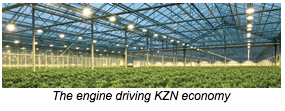 KwaZulu-Natal Premier Dr Zweli Mkhize said the province would target certain farming sectors such as red meat (mainly goat and beef), poultry, dairy, maize, dry beans, soya beans and egg producing to increase the province’s ability to export fresh produce to other countries through the Dube Trade Port.
KwaZulu-Natal Premier Dr Zweli Mkhize said the province would target certain farming sectors such as red meat (mainly goat and beef), poultry, dairy, maize, dry beans, soya beans and egg producing to increase the province’s ability to export fresh produce to other countries through the Dube Trade Port.
With its favourable climate, the province is able to focus on producing for the local market, as well as on export markets, particularly Middle Eastern countries.
New projects
The provincial government is looking at starting new agricultural projects involving emerging, subsistence and commercial farmers. These include the Besters Beef operation outside Ladysmith, the Jikijela Agricultural Project involving five areas in Maphumulo, and other smaller projects such as Masibambisane in Nkandla and Dawn Valley Farm in Ixopo.
"The present number of tractors and agricultural implements will need to be doubled in the next two years to match the increasing demand of farmers who will be motivated into action by the successes of the programme," the Premier said. He added that advanced work had been undertaken to promote vegetable and fruit production to support the export programme through the Dube Trade Port.
Development Agency
“The Department of Agriculture, Environmental Affairs and Rural Development and the Trade Port have identified specific farms in all districts where there is potential for massive production of high value crops for export,” said Mkhize. Products to be exported include cut flowers, fresh vegetables and fruits.
To speed up the export programme, the provincial government set up the Agri-business Development Agency (ADA) in 2009. This agency, jointly managed by the Department of Economic Development and Tourism and the Department of Agriculture, Environmental Affairs and Rural Development supports emerging farmers and those farmers who got land through land reform programmes.
Passion and determination
Mkhize said ADA was set up to help emerging farmers, who were in debt and were about to lose their farms. The agency has provided these farmers with planning services, technical support, mentorship and renegotiating debt repayment. It also helped to link the farmers with markets for their products.
“Many farms have been saved from liquidation,” he said. “I have recently had the privilege of meeting the emerging farmers receiving the services from the agency. They listed all the challenges faced by emerging farmers, urging government to do more to support their farming enterprises. I was encouraged as I saw their passion for their work, their appreciation of the service and their determination to make the country succeed,” Mkhize said.
Cool success with ice cream
Cool success with ice cream sadminYou will find them everywhere where many people are gathered. They can be seen outside school premises during breaks or after school; sometimes you bump into them on the streets or even at cemeteries where mourners are gathered. These young entrepreneurs are part of the Ice-Cream-On-Wheels project, a partnership between the National Youth Development Agency (NYDA) and Nestlé SA.
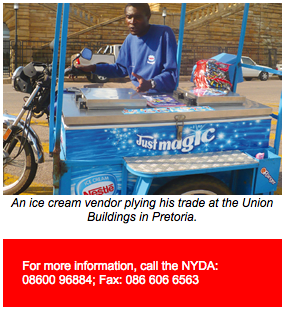 The main goal of the Ice-Cream-On-Wheels project is to help young people get involved in the business of selling ice cream. Nestlé SA gives them R1 500 worth of initial stock to sell. The profits from the stock are used to buy more stock from Nestlé SA.
The main goal of the Ice-Cream-On-Wheels project is to help young people get involved in the business of selling ice cream. Nestlé SA gives them R1 500 worth of initial stock to sell. The profits from the stock are used to buy more stock from Nestlé SA.
In addition, Nestlé SA gives each young entrepreneur a motorbike or bicycle, a freezer, branded shirts, trousers and caps. They also receive product training on how to run their businesses.
The project is in its sixth year. It was started in 2005 by the former Umsobomvu Youth Fund (UYF) to address poverty and unemployment among young people by encouraging them to become entrepreneurs. Youth participating in the project are recruited by the NYDA and they get financial support, training and mentorship.
In addition, several Further Education and Training (FET) colleges are involved with training them in different business practices, including life skills and how to obtain a motorbike licence.
Bangkok
The idea of training ice cream vendors was based on a vending system in Bangkok, Thailand. In South Africa, Nestlé currently has about 3 000 vendors on motorbikes taking ice-cream products closer to consumers.
The ice cream project was first tried in Mamelodi, Tshwane in 2006 with 15 motorbikes. The trial was very successful with vendors each earning profits of between R3 000 and R6 000 in the first month. The decision was then made to make the project national.
Your future begins here … Join the National Treasury Graduate Development Programme
Your future begins here … Join the National Treasury Graduate Development Programme sadminThe National Treasury is committed to youth and skills development in South Africa. We provide graduates an opportunity to gain meaningful workplace experience to complement their studies. Our Graduate Development Programme is directed at those who have or are in the process of completing their studies. Graduate recruits will be part of a supportive environment allowing for continuous development. National Treasury Graduate Development Programme (NTGDP) consists of two programmes: the Internship programme, and the Chartered Accountant Academy (CAA) – previously known as the Training Outside of Public Practice Programme (TOPP).
Internship Programme
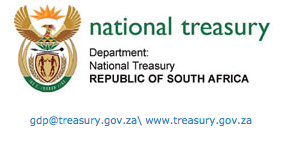 Our 24-month internship programme offers trainees the opportunity to enhance their skills in the following areas:
Our 24-month internship programme offers trainees the opportunity to enhance their skills in the following areas:
- Economics
- Accounting
- Taxation
- Procurement/ Supply Chain Management
- Econometrics
- Statistics/Mathematics
- Human Resources Management
- Communications
- Finance (financial markets, pricing of securities, corporate finance, investment and risk management)
- Public Finance
- Social policy / Labour economics / Development economics
- Public policy
- Computer Science/Information Systems
All interns undergo a number of in-house learning interventions to prepare them for the transition into the world of work, giving them the skills to become competent and credible employees.
Remuneration
Interns are offered competitive market-related salaries, which are structured according to the individual areas of work, level of expertise and qualification.
Criteria
To qualify for the internship programme, you must have completed or be in the process of completing your undergraduate or postgraduate studies in the field of:
- Accounting
- Economics
- Econometrics
- Economic Modelling
- Supply Chain Management
- Communications
- Finance/Financial Management
- Taxation
- Computer Science/Information Systems
- Human Resource Management; or
- Statistics and Mathematics
You must have an average of 60% or higher.
Recruitment
The National Treasury team will be embarking on recruitment drives at universities around the country. Look out for further information around campus or at your university’s careers office.
Frequently asked questions
Q. What must I have in order to be considered for the National Treasury Graduate Development Programme?
A. Graduates must have completed their degrees and or post graduate studies with an average of 60% or higher and must be South African citizens. A comprehensive selection process is also followed, including and not limited to interviews and, competency assessments.
Q. What must I have studied to qualify for the Internship Programme?
A. Graduates must have completed or be in the final year of completing their undergraduate or post-graduate degrees with majors in the following fields:
- Economics
- Accounting
- Taxation
- Procurement/ Supply Chain Management
- Corporate governance
- Econometrics
- Statistics/Mathematics
- Human Resources Management
- Communications
- Finance (financial markets, pricing of securities, corporate finance, investment and risk management)
- Public Finance
- Social policy / Labour economics / Development economics
- Public policy
- Computer Science/Information Systems
Q. What is the salary offering?
A. Interns are offered a market related salary.
Q. What kind of development initiatives will I be exposed to while on the Internship Programme?
A. All interns receive on-the-job training. There will be a learning agreement between the line manager and the intern to ensure that interns are developed according to their job description and the specific job competencies required.
Q. Where would I be based during the programme?
A. All interns will be based at the National Treasury’s offices in Pretoria.
Q. How long is the Internship Programme, and what happens thereafter?
A. The internship programme runs for 24 months. Permanent placement in the department after the programme is not guaranteed. Interns are encouraged to apply for permanent positions after one year on the programme. Most of our interns have been appointed into permanent positions. Should you not be appointed to a permanent position at the end of the programme, the intern will receive a letter of reference.
Q. Would I qualify for leave?
A. Interns qualify for certain types of leave.
Q. How do I apply?
A. Complete and submit the CAA application form available on National Treasury’s website (www.treasury.gov.za), and attach the following:
- Updated CV
- Certified copy of your SA identity document
- Full official academic transcripts/results
or post to:
The HR Specialist
National Treasury
Private Bag X 115
Pretoria 0001
Closing date for applications: 31 July 2011
Tackling poverty, uplifting communities
Tackling poverty, uplifting communities sadminThe Community Work Programme (CWP) is aimed at uplifting communities by tackling poverty and unemployment. The programme helps individuals and families to earn an income by providing employment opportunities. The primary purpose of the CWP is to create access to a minimum level of regular and predictable work opportunities for unemployed people. It targets areas of high unemployment, where sustainable opportunities are likely to remain limited for some time.
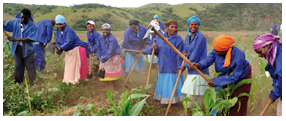 The CWP is an ongoing programme that does not replace government’s existing social grants, but supplements it.
The CWP is an ongoing programme that does not replace government’s existing social grants, but supplements it.
The CWP, which is run by the Department of Cooperative Governance and traditional Affairs (CoGTA), is meant as a safety net for unemployed people, not an employment solution. It aims to strengthen community development and to improve the quality of life in poor areas. Unemployed and underemployed people of working age qualify to participate. They are paid a daily rate of R60 per day and work for only two days a week, eight days a month and 100 days a year.
The programme runs in all nine provinces, 45 municipalities and 417 wards. From April 2010 to March 2011, 89 689 work opportunities have been created throughout the country through the CWP. It is intended to be ongoing with participants moving in and out of the programme as their needs change.
Useful work
The CWP is community driven with communities being actively involved in identifying ‘useful work’ needed in their areas. This means the work must improve the quality of life in poor communities by helping to create and maintain community assets and developing services. It includes a mix of activities such as home-based care, food gardens, environmental services, and the creation and maintenance of public facilities such as parks, water tanks and roads.
The African Honey Bee project, a job-creation initiative in Mpumalanga’s Bushbuckridge area, aims to equip and empower 500 beekeepers in the area. While the programme is in the start-up phase the beekeepers receive a daily allowance from government’s Community Work Programme (CWP).
African Honey Bee was involved in five pilot projects in other parts of the country before deciding on Bushbuckridge as the ideal spot to launch the full five-phase programme.
Training
The beekeepers will have their own businesses rather than being part of a collective system. They will receive training, mentorship, advance payment on their future honey production, equipment at special prices and access to global and local markets for their produce.
African Honey Bee and their training partner, Skills for Africa, are confident that further development funding will become available to ensure that the first group of 100 beekeepers will reach their production target of 200 tonnes of honey within 36 months.
Environment
With its emphasis on environmentally friendly job creation in one of the province’s poorest regions, the beekeeping project is widely supported by the local community, the agricultural sector and development funders.
The Mpumalanga provincial government also supports the programme as part of its rural poverty alleviation programme. “The province is 100 per cent behind the initiative,” says Ms Mungi Ramabenyane, Chief Director of the Department of Agriculture, Rural Development and Land Administration.
For more information about the CWP, Call 012 334 0600
New look hotel boosts job creation
New look hotel boosts job creation sadminThe Golden Gate Hotel in the Golden Gate Highlands National Park in Qwaqwa has been upgraded to attract more tourists. The hotel will play a vital role in providing jobs and creating wealth for the area, said Environmental and Water Affairs Minister, Edna Molewa at the launch on 5 June.
 The breathtaking landscape of the Golden Gate Highlands National Park with its scenic mountains and majestic sandstone cliffs is a prime tourist attraction. The hotel, which was initially built in 1971, boasts revamped restaurants, 54 luxury rooms and conference facilities with a seating capacity of 300.
The breathtaking landscape of the Golden Gate Highlands National Park with its scenic mountains and majestic sandstone cliffs is a prime tourist attraction. The hotel, which was initially built in 1971, boasts revamped restaurants, 54 luxury rooms and conference facilities with a seating capacity of 300.
With its new look and upgraded facilities, it will attract more tourists to the area, which in turn will create more jobs and generate wealth. It will also help to develop hospitality-related skills.
Wildlife
The area boasts a variety of attractions for nature lovers. It is home to 10 antelope species, more than 50 grass species and about 140 bird species. A special hide enables bird lovers to observe the park’s vultures up close. The park derives its name from the rays of the setting sun on the striking west-facing sandstone cliffs, which turns them into a glowing gold colour.
World Environment Day
The opening of the hotel coincided with World Environmental Day on 5 June. Minister Molewa used the opportunity to encourage the public to work hand in hand with government in taking care of the environment.
Eskom bursary and in-service training
Eskom bursary and in-service training sadminEskom Bursary is committed to ensuring that all qualified students have continued access to high-quality educational programmes that will provide them with the skills and expertise they need for their future success. The aim of the bursary programmes is to provide students with support in specific disciplines that are in line with our business needs. The bursaries are offered to students in technical colleges, technikons and universities, in particular to talented youngsters who could become future employees.
Bursary eligible criteria
 To be eligible for Technical College Bursary you must:
To be eligible for Technical College Bursary you must:
- have a Senior Certificate and written proof of acceptance for admission by a technical college and faculty
- be an SA citizen
- have Senior Certificate / N3
- have English HG (D) SG (C)
- have Mathematics HG (D) SG (C)
- have Physical Science HG (D) SG (C)
Any bursary awarded is subject to the condition that the candidate’ must obtain good results at the end of the study year.
Applicant may not receive any other grant for the same qualification without prior written approval.
The bursary will be suspended for one trimester if the student fails.
The bursary will have to be paid back on cancellation of the course (full value plus compound interest at prime rate).
Only training in accordance with the Eskom and Allied Industries Training Board (EAITB) or other recognised training board will be allowed.
Eskom’s long-term skills requirements will be taken into account in granting a bursary.
To be eligible for an Eskom university bursary , the following will apply:
- be SA citizenship
- matric exemption
- English HG (C)
- Mathematics HG (C)
- Physical Science HG (C)
- applicant may not receive any other grant for the same qualification without prior written approval
- a service contract equal to the duration of the bursary
- allocation of bursary based on merits
- compulsory practical training
- maximum study of three years (further study in approved cases)
- the bursary will be suspended for one semester if the student fails
- the bursary will be reinstated only once
- the bursary will have to be paid back on cancellation (full value plus compound interest at prime rate)
- 100% of the prescribed university tuition fees, registration fees, and examination fees is paid.
University of Technology bursary applicants must have the following:
- Senior Certificate and written proof of acceptance for admission by the technikon and faculty
- SA citizen
- Senior Certificate / N3
- English HG (D) SG (C)
- Mathematics HG (D) SG (C)
- Physical Science HG (D) SG (C)
- Bursary is subject to good results at the end of the year
- Applicant may not receive any other grant for the same qualification without prior written approval
- Suspend one trimester on failure
- Pay back on cancellation (full value plus compound interest at prime rate)
- Training in accordance with Eskom and Allied Industries Training Board (AITB) or recognized training board.
What the bursary covers
- Registration fees
- Tuition fees
- Residence fees
- Allowance for practical (theoretical) training (books, etc.)
- Accommodation during practical and institutionalized training as determined by Eskom
- Trade test costs.
Applications for bursaries close on 31 July 2011
Transnet bursary applications
Transnet bursary applications sadminTransnet is a focused and integrated freight transport company, which is essentially driven by five operating divisions Transnet Freight Rail, Transnet Rail Engineering, Transnet National Ports Authority, Transnet Port Terminals and Transnet Pipelines. These operating divisions supported by company-wide specialist functions give meaning to our philosophy of "One Company, One Vision".
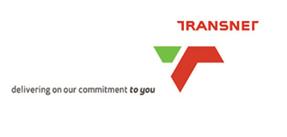 Our business philosophy of “delivering on our commitment to you” not only applies to our business practices but also to you as one of our prospective future bursary holders.
Our business philosophy of “delivering on our commitment to you” not only applies to our business practices but also to you as one of our prospective future bursary holders.
Transnet Group CE, Transnet Limited, Transnet full-time bursaries, Full-time undergraduate/diploma studies, Full-time bursaries are awarded annually according to the employment needs of the company. All our full-time students are viewed as potential employees depending on vacancies being available after successfully completing their qualifications.
Who can apply?
All South African citizens who meet the entry requirements of the relevant tertiary institutions and the chosen field of study. Application forms are available here on the website as an online application form, or download the Adobe Acrobat PDF form which can be printed and filled in, or from the Transnet Bursary section.
Bursary Office Address
Room 4206
Carlton Centre
150 Commissioner Street
Johannesburg
Tel 011 308 2799
Fax 011 774 9235
Toll free 0800 601 226
Students are allowed to study at a university or university of technology (technikon) of their own choice, which offers the relevant fields of study.
The closing date for applications is 31 July for each academic year.
Bursary value
The comprehensive bursary covers the following:
- Tuition fees
- Accommodation and meals
- Book allowance
- Computer – if a requirement from the 2nd year
- Experiential training/vocational work
Fields of study
This list may vary depending on the needs of the company:
- B.Eng N.Dip
- Industrial Industrial Eng.
- Electrical Electrical Eng.
- Electronic Electronical Eng.
- Mechanical Mechanical Eng.
- Civil Civil Eng
- Electro-Mech
- Metallurgy
Selection
After the screening of applications by the Transnet Bursary Department, candidates - based on academic performance on secondary or tertiary level - will be invited, to be interviewed. The interviews will take place at Johannesburg, Bloemfontein, Cape Town, Durban and Port Elizabeth.
The final selection and award is subjective to: Interview, satisfactory academic results and medical fitness.
Contractual obligations
University bursars:
University students are required to render one year of service for every year of financial aid received from Transnet after acquiring the qualification.
Subjects failed must be repeated at student’s own cost. Termination of the bursary will be in consultation with the student and the training institution.
If the student fails to comply with the requirements of the bursary agreement, the bursary becomes payable in terms of the agreement
The bursary will be renewed annually if the student’s progress is satisfactory.
University of Technology bursars:
University of Technology (Technikon) students who are selected for Work Integrated Learning will be required to serve the company for one year.
Subjects failed must be repeated at student’s own cost. Termination of the bursary will be in consultation with the student and the training institution. If the student fails to comply with the requirements of the bursary agreement, the bursary becomes payable in terms of the agreement.
The bursary will be renewed annually if the student’s progress is satisfactory.
Work-integrated learning
Transnet provides work integrated learning and vocational work to obtain the qualification in line with the requirements set by the training institution. The students are remunerated according to their academic status.
Vacation work
Vacation work is available during June/July or December/January holidays. Students must apply at least one month prior, to enable the bursary department to make the necessary arrangements in collaboration with the line people where they have been allocated to.
The following information must be supplied: Required period, preferred location, academic level, copy of identity document, bank details.
Accommodation arrangements are the student’s responsibility and must be paid for by the student with the allowance received.
10 000 jobs for youth
10 000 jobs for youth sadminYouth matters
Unemployment, illiteracy, lack of skills, poverty and lack of access to water and electricity are just some of the realities facing young rural people today. But there is hope in the form of the National Rural Youth Service Corps (NARYSEC). This is a skills development programme aimed at rural youth, which is expected to create 10 000 jobs.
 The Department of Rural Development and Land Reform introduced the NARYSEC programme in 2010 with the aim of providing unemployed youth in the rural areas with opportunities to work in their communities.
The Department of Rural Development and Land Reform introduced the NARYSEC programme in 2010 with the aim of providing unemployed youth in the rural areas with opportunities to work in their communities.
Rural youth
The NARYSEC targets youth from rural areas, including those living with disabilities, between the ages of 18 to 35 and who have at least passed Grade 10. It is a two-year programme aimed at empowering rural youth from each of the 3 300 rural wards across the country.
About 500 candidates, who underwent an intensive seven-week training programme in Phase 1, were selected by the Department of Defence and Military Veterans at the Brug Military Base in the Free State.
Make a difference
The programme has given 28-year-old Roseline Moakamela from Kungwini Municipality in Gauteng, an opportunity to be a part of something bigger by giving her a chance to make a difference in her community. “Since I started with the training, I no longer feel hopeless and with the monthly stipend we are receiving, I can see that good things are still coming. I’m now patriotic about my country and I can’t wait to receive those skills to construct roads and houses in order to make a difference in my community,” she said.
Recently, 500 candidates graduated from the programme. Rural Development and Land Reform Minister Gugile Nkwinti said he looked forward to it expanding in an effort to help young people find their potential.
According to Nkwinti, the programme is part of the department’s job creation model, which targets and ensures that at least one person per household in the rural areas, where the Comprehensive Rural Development Programme (CRDP) is piloted, are employed for two years.
Vibrant communities
The job creation and skills development programme was initiated in line with the department’s rural development mandate to create vibrant, equitable and sustainable rural communities throughout South Africa.
“We look forward to expanding this programme even further to more NARYSEC participants in more military facilities,” the minister said. Candidates who have completed their two-year training will be able to help develop their own communities.
For Justice Mookudi, 34, from Morukweni in Matlhabatlhaba village in the North West, the training was a valuable experience. “Through this training I’ve learnt not to give up in life. Now, I am looking forward to receiving intensive training so that I can bring development in my area,” he said.
“I can’t wait to be an entrepreneur at my settlement and I am not going to be selfish as I will work together with other young people to bring about changes in our area,” says 25-year-old Brian Morgan Kriel from Vredendal in the Western Cape.
Values and respect
The students were trained in values, respect, leadership and negotiation skills. They also learned about their country and the African continent.
“With all those acquired skills, we believe when they return to their villages, other people will notice a difference and we believe that they will begin to revive hope in their friends,” said Lieutenant General Derrick Mgwebi of the Defence and Military Veterans.
Training young artisans
Training young artisans sadminYouth matters
As part of its contribution to job creation, the National Youth Development Agency (NYDA) launched a programme to address the shortage of artisan skills particularly among youth. Recently, 100 young people who successfully completed the Accelerated Artisans and Skills Training Programme, were awarded certificates.
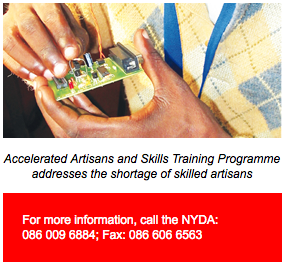 The NYDA skills training programme is aimed at disadvantaged unemployed young people between the ages of 16 and 35 who do not have skills to enter the job market. In addition to training, each learner will receive an allowance for meals and transport costs as part of the programme.
The NYDA skills training programme is aimed at disadvantaged unemployed young people between the ages of 16 and 35 who do not have skills to enter the job market. In addition to training, each learner will receive an allowance for meals and transport costs as part of the programme.
Courses
Courses offered within the programme include electrical engineering, plumbing, boiler making, welding, bricklaying carpentry, forklift, computer numerical control programming or air conditioning and refrigeration training at the following centres:
- Mpumalanga: Tonga, Belfast, Machadosdorp, Delmas and Kwa-Mhlanga
- Northern Cape: Kimberley
- Gauteng: Ekurhuleni Artisan and Skills Training Centre in Kempton Park
- North West: Tlhabane Technical Centre in Rustenburg
Self-employment
The programme encourages learners who have completed courses to create self-employment opportunities.
The NYDA will provide the following financial and non-financial support programmes and services:
- The Enterprise Finance Division offers loans ranging from R1 000 to R5 million
- The Business Consultancy Services Voucher Programme offers young entrepreneurs access to business development support services such as bookkeeping, marketing, tendering support, website development and more for just R200.
- The Volunteer Mentorship Programme links up-and-coming entrepreneurs with established entrepreneurs.
- The Business Opportunities Support Services section links young entrepreneurs to emerging procurement opportunities in the private and public sectors.
Encourage women
One of the programme participants, Tebogo Madigage, studied electrical engineering. Upon completion she registered with the NYDA’s Jobs and Opportunities Database.
“I was happy when the NYDA called me to come through for the assessment. I enjoyed the programme and would like to encourage more women to explore a career in the electrical sector as it still male dominated,” she said.
Meet Paul Mashatile, Minister of Arts and Culture
Meet Paul Mashatile, Minister of Arts and Culture sadminKnow your Minister
Minister of Arts and Culture, Paul Mashatile was born on 21 October 1961.
 Before his November 2010 appointment as a Minister, he had been Deputy Minister of Arts and Culture since May 2009. As Minister of Arts and Culture, Mashatile is the Champion of the Moral Regeneration Movement. Mashatile became President of the Alexandra Youth Congress in 1983 and was active in the Congress of South African Students (Cosas). During this time, he was also Assistant General Secretary of the UDF (Southern Transvaal branch).
Before his November 2010 appointment as a Minister, he had been Deputy Minister of Arts and Culture since May 2009. As Minister of Arts and Culture, Mashatile is the Champion of the Moral Regeneration Movement. Mashatile became President of the Alexandra Youth Congress in 1983 and was active in the Congress of South African Students (Cosas). During this time, he was also Assistant General Secretary of the UDF (Southern Transvaal branch).
In 1991 and 1992 he was Head of Political Education of the ANC in Gauteng and from 1992 to 1998 he was Provincial Secretary of the ANC.
He has been the Provincial Chairperson of the ANC in Gauteng since 2007. In 1994, Mashatile became a member of the Gauteng Provincial Legislature as Leader of the House. In 1996, he was appointed MEC for Transport and Public Works and in 1998 as MEC for Safety and Security. From 1999 to 2004, he served as MEC for Housing until his appointment as MEC for Finance and Economic Affairs.
Minister Mashatile holds a post-graduate diploma in Economic Principles from the University of London.
Moral values revitalised
Moral values revitalised sadminKnow your Minister: Arts and Culture
July is celebrated as Moral Regeneration Month. This is the birthday month of Nelson Mandela who inspired the formation of the Moral Regeneration Movement. It is also the month in which the Charter of Positive Values was adopted. The Department of Arts and Culture is responsible for matters relating to moral regeneration.
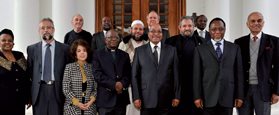 During his time as President of South Africa, Nelson Mandela was concerned about the decline in the country’s moral values. In June 1997, he held a meeting with key South African religious and spiritual leaders to discuss the role of religion in nation building and social transformation. It included the need for such institutions to work with government in rebuilding the moral fabric of the nation. This was the foundation of the Moral Regeneration Movement.
During his time as President of South Africa, Nelson Mandela was concerned about the decline in the country’s moral values. In June 1997, he held a meeting with key South African religious and spiritual leaders to discuss the role of religion in nation building and social transformation. It included the need for such institutions to work with government in rebuilding the moral fabric of the nation. This was the foundation of the Moral Regeneration Movement.
Challenges
The Moral Regeneration Movement aims to correct distrust among South Africans after more than 40 years of discrimination. Years of apartheid oppression led to negative feelings and people losing faith in the justice system. This has contributed to the increase in crime.
Among the challenges identified, is corruption in the private as well as public sector. This has led to positions of responsibility often being treated as opportunities for self-enrichment. Other challenges identified include violent behaviour in inter-personal relationships and within families, in particular the high incidence of abuse of women and children.
Regeneration means to revitalise, rebuild or give new life to something. The Moral Regeneration Movement aims to revitalize the moral values of the South African people.
Summit
A Moral Regeneration Summit was held in 1998 and after the 1999 election, the moral regeneration initiative began to enjoy more formal attention from the Presidency. In dividing up political and administrative tasks between the President and Deputy President in the early days of their term, the then Deputy President Jacob Zuma was allocated responsibility as champion of the Moral Regeneration Movement.
Arts and culture
In recent years, the Moral Regeneration Movement has formed partnerships with the National Heritage Council, the National House of Traditional Leadership and the Department of Arts and Culture.
This resulted in the Department of Arts and Culture becoming the Department responsible for matters relating to the Moral Regeneration Movement and the Minister being its champion.
Charter of positive values
-- Respect human dignity and equality.
-- Promote freedom, the rule of law and democracy.
-- Improve material well-being and economic justice.
-- Develop sound family and community values.
-- Uphold honesty, integrity and loyalty.
-- Ensure harmony in culture, belief and conscience.
-- Show respect and concern for all people.
-- Fight for justice, fairness and peaceful co-existence.
-- Protect the environment.
For more information on the Moral Regeneration Movement, call: 011 403 3559.
'Golden economy' gets its rightful place
'Golden economy' gets its rightful place sadminKnow your Minister: Arts and Culture
As part of the bigger plan to create jobs in line with the New Growth Path, the Department of Arts and Culture is involved in programmes that will see the arts, culture and heritage sectors actively involved in growing the economy.
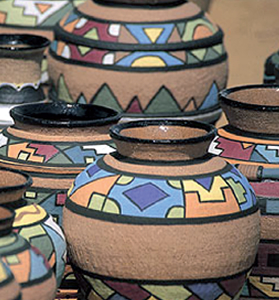 The arts, culture and heritage industries have earned the name “Mzansi’s golden economy,” said Arts and Culture Minister, Paul Mashatile during a two-day Arts, Culture and Heritage Summit held in Johannesburg recently.
The arts, culture and heritage industries have earned the name “Mzansi’s golden economy,” said Arts and Culture Minister, Paul Mashatile during a two-day Arts, Culture and Heritage Summit held in Johannesburg recently.
Organised by the Department of Arts and Culture, various key players exchanged ideas on how to grow the arts, culture and heritage industries to take their rightful places in job creation and economic growth.
Major contributors
“The creative sector in South Africa has the potential to be a leading sector in generating economic growth, employment and trade as is the case in many advanced economies,” the Minister said.
Some of the proposals agreed on at the conference include promoting the appreciation of the arts among young people, establishing a National Skills Academy for the Arts and Culture and an art bank for displaying artworks in government buildings. The Minister said R6,5 million had been set aside as part of their commitment to youth programmes in the arts.
The National Skills Academy for the Arts will pool all the activities of the various arts training organisations in the country. It is planned as a centre of excellence responsible for developing the best talent in South Africa to compete successfully on the world stage.
The Department is also working with the Department of Basic Education to include visual arts and performing arts in the curriculum.
President's call to action bears fruit
President's call to action bears fruit sadminPresidential Hotline
Ordinary citizens continue to get help from the Presidential Hotline in solving problems experienced when dealing with different levels of government. People who have tried but failed through other channels, are welcome to turn to the Presidential Hotline.
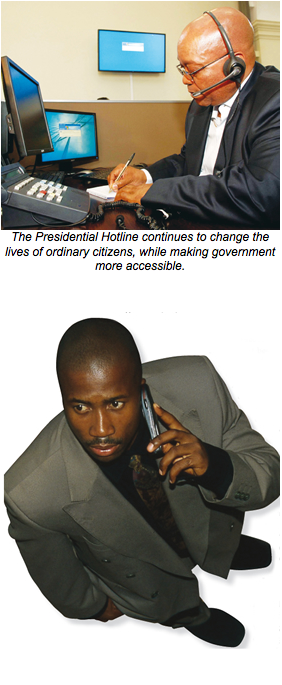 Ms Moyeni of Eastern Cape is one of the people whose problem was solved after turning to the Presidential Hotline for help. She had tried other channels without success. In August last year, Moyeni called the hotline after her mother's old-age grant was stopped. She was told that she had to make a new application.
Ms Moyeni of Eastern Cape is one of the people whose problem was solved after turning to the Presidential Hotline for help. She had tried other channels without success. In August last year, Moyeni called the hotline after her mother's old-age grant was stopped. She was told that she had to make a new application.
New application
In November last year, her mother did re-apply for the grant and was promised that the grant would be continued.
However, months passed and Moyeni’s mother did not receive her old-age grant. South African Social Security Agency (Sassa) officials in Bhisho said she would be paid in January this year but that did not happen. When the Moyeni family enquired about the delay in the payment of the old-age grant, Sassa officials told them that the grant had been stopped because Sassa thought the beneficiary (Moyeni’s mother) had died. Presidential Hotline staff made further enquiries and it was confirmed that Moyeni’s mother was still alive.
In February this year, Moyeni’s mother was paid R6 480 for the months that she had not been receiving her grant since August last year. In March, she began receiving her regular monthly old-age grant of R1 080.
Unemployment fund
Another caller approached the Presidential Hotline after she had struggled to get her late father’s contribution to the Unemployment Insurance Fund (UIF). Her father had claimed UIF in 2008 and while waiting the outcome of his application, he passed away.
She followed up her father’s UIF claim but was told that the document she had signed was incorrect and she had to fill a new form in 2009. On investigation, the Presidential Hotline found that her father’s UIF claim had been approved in June 2008. However by March 2010, her father’s UIF contribution had not been paid. In March 2010, she was requested to produce her father’s salary advice (payment slip) but still no payment was received. After the Presidential Hotline followed up the matter, the UIF said payment would be made in March this year.
Sewage
A resident of the Free State town of Clocolane Ms Sebolelo Motseki also called the Presidential Hotline to complain about the local municipality’s failure to regularly collect full sewage buckets. Her area still uses the bucket toilet system.
Motseki went to the Municipal Manager’s office to complain about the uncollected full sewege buckets. Officials at the Municipal Manager’s office had told her the truck that collected the wastewater refuse buckets had broken down.
A few days after reporting the matter to the Presidential Hotline, Motseki said municipal workers came to collect the wastewater refuse buckets.
Water and electricity
Another caller to the Hotline Mr Moeketsi Mphale of Nyarel informal settlement in the Naledi Municipality in the Free State called to complain for not getting water and electricity.
Mphale said he had been promised water and electricity and a better place but that did not happen. Mphale is disabled with one leg amputated and he struggles to fetch water from neighbours.
Since the matter was reported to the Hotline, the Naledi Municipality has installed water and electricity for Mphale. His application for a formal house is also being attended to.
The National AIDS Helpline – 0800 012 322 – provides a confidential, anonymous 24-hour toll-free telephone counselling, information and referral service for those infected and affected by HIV and AIDS.
The AIDS Helpline was initiated in 1991 and is a partnership of the Department of Health and LifeLine Southern Africa.
The Helpline, staffed by trained lay counsellors, receives an average of 3 000 calls per day, and is seen as a leading telephone counselling service with-in the SADC region
Following the example of the Presidential Hotline, the Limpopo Provincial Government has launched its own hotline in the Office of the Premier.
Premier Cassel Mathale officially launched the hotline in April making Limpopo the first province to offer a regional hotline.
Mathale said the toll-free hotline was available to all people in the province.
Arrangements have been made to accommodate the following official languages: Sepedi, English, IsiNdebele, Tshivenda, SiSwati, XiTshonga and Afrikaans.
The Limpopo Premier's toll-free Hotline number is: 0800 864 729.
17737 (1 PRES),
Fax: 086 681 0987 / 012 323 8246;
e-mail: president@po.gov.za
SA-China partnership a warning to criminals
SA-China partnership a warning to criminals sadminInternational relations
A strong warning has gone out to criminals who commit crimes in South Africa and escape to China as a hideout or vice versa. This follows a new partnership between police in the two countries to reinforce cooperation on security matters between the two countries.
 Discussions aimed at strengthening cooperation in dealing with crime and crime syndicates between South Africa and China were held in Pretoria recently between Deputy Minister of Police Ms Maggie Sotyu and her Chinese counterpart, Vice Minister of Public Security Mr Zhang Xinfeng.
Discussions aimed at strengthening cooperation in dealing with crime and crime syndicates between South Africa and China were held in Pretoria recently between Deputy Minister of Police Ms Maggie Sotyu and her Chinese counterpart, Vice Minister of Public Security Mr Zhang Xinfeng.
Trans-national crimes
Both ministries have committed themselves to strengthening cooperation in combating trans-national crimes and to take all necessary measures within their territories to ensure the safety of institutions and people from both countries.
The ministers agreed that the protection of such rights was fundamental to the wellbeing and social and economic development of their people.
Deputy Minister Sotyu said government was concerned that the networks of crime had grown across national boundaries. The Ministry of Police therefore remained committed to providing China with any assistance with investigations and handover of crime suspects, she said.
Information sharing
The ministry is also committed to co-operate with China to improve exchange of intelligence and information sharing. These would include ways to combat terrorist activities, drug trafficking, illegal immigration, money laundering, arms smuggling and human trafficking, especially involving women and children.
Energy for Africa's future needs
Energy for Africa's future needs sadminInternational relations
The 2nd Regional Conference on Energy and Nuclear Power in Africa took place in Cape Town on 30 and 31 May. Hosted by the Department of Energy and the International Atomic Energy Agency (IAEA), the conference was an opportunity for African member states to present and discuss the role of nuclear power in meeting Africa's future energy needs. It included presentations of lessons learned from nuclear power countries.
 Most people in Africa do not have access to electricity and many fall ill due to unsafe energy supplies. It is therefore vital for African states to work together in finding solutions to generate more energy that is safe and accessible to all.
Most people in Africa do not have access to electricity and many fall ill due to unsafe energy supplies. It is therefore vital for African states to work together in finding solutions to generate more energy that is safe and accessible to all.
Several electricity-generation projects for both coal-fired power stations and hydro energy, are planned or under construction in Africa. Working together to develop these, will not only ensure economic growth on the continent, but will also improve the lives of Africa’s people.
“We have been working together in the past, since the first regional conference in Cairo, Egypt, two years ago, and are continuing to do so today,” said Minister of Energy Ms Dipuo Peters at the opening of the regional conference. Among other things, the conference looked at ways in which the IAEA will support the introduction of nuclear power into developing countries.
Integrated resource plan
While nuclear and renewable energy will make an important contribution to the planned mix of energy generation in South Africa, it is not a quick-fix solution, but a long-term method to address the energy challenge, Peters said.
South Africa has a balanced energy mix. The different energy sources are not competing, but are rather supportive of each other since none of them on their own can meet the electricity needs of the country.
To this end, the country’s Integrated Resource Plan (IRP), which addresses the electricity generation mix for the next 20 years, was lauched in May. “This is a balanced plan that seeks to responsibly use energy sources available to us including gas, biomass, nuclear, coal and imported sources,” the Minister said.
World trade talks continue beyond 2011
World trade talks continue beyond 2011 sadminInternational relations
The Doha Development Round is a round of talks between member countries of the World Trade Organisation (WTO) to reach agreements on international trade. It started in November 2001 and has not yet been finalised, because member countries have not been able to agree on certain key issues.
The objective of the Doha Development Round is to lower trade barriers around the world to help increase global trade. The Doha Round began with a meeting of ministers in Doha, Qatar in 2001. Since then, ministerial meetings have taken place in Cancún, Mexico, and in Hong Kong. Related negotiations also took place in Geneva, Switzerland; Paris, France and Potsdam, Germany.
Talks have stalled due to differences on major issues, such as agriculture, industrial tariffs and services.
Plan B
Addressing a media briefing in Pretoria ahead of a meeting of the WTO’s Trade Negotiation Committee in Geneva on 1 June, the Minister of Trade and Industry, Rob Davies, said the Doha Development Round would not be finalised this year. However, a Plan B to support trade to the least developed countries was on the cards.
Part of Plan B could be delivered by the end of this year, he said. This would help to reach agreements in a “smaller package”, while leaving out the trade measures on which agreements could not be reached, Davies said.
It will focus on issues such as customs cooperation, rules about regional trade agreements and fishing subsidies. The primary focus will be to deliver trade benefits to countries from the least developed world.
Free trade wanted
South Africa will focus on deepening trade relations in Africa to help open up trade to more of the least-developed countries. A free trade area between the Southern African Development Community (SADC), the Common Market for Eastern and Southern Africa (Comesa) and the East African Community (EAC) will go a long way to achieving this, said Davies. These three regional economic communities held a meeting in South Africa in June.
South Africa’s membership of the Brics group (Brazil, Russia, India, China, South Africa) also offers the country major opportunities for trade and development, the Minister said.
Make every day a Mandela Day
Make every day a Mandela Day Estelle GreeffCelebrating Madiba
Every year on 18 July – Nelson Mandela’s birthday – South Africa and the rest of the world join hands to celebrate International Mandela Day.
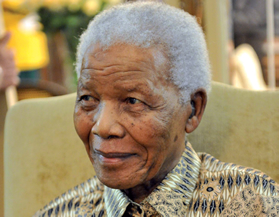 The Mandela Day message for 2011 is centred around “change”. It is a call to action for people everywhere to take responsibility for making the world a better place, one small step at a time, just as Madiba did. Nelson Mandela spent 67 years of his life serving his community, the country and the world at large in the struggle for peace and equality.
The Mandela Day message for 2011 is centred around “change”. It is a call to action for people everywhere to take responsibility for making the world a better place, one small step at a time, just as Madiba did. Nelson Mandela spent 67 years of his life serving his community, the country and the world at large in the struggle for peace and equality.
To celebrate his life and the values he embraces, International Mandela Day was launched in 2009. It encourages people to do something good, no matter how big or small for 67 minutes on this day.
Mandela Mondays
In addition to Mandela Day, Mandela Mondays was started on 1 June 2011 to encourage people to make time in their schedules to do good deeds every day, even if it’s just for a few minutes. The Nelson Mandela Foundation has come up with this idea as a way to realise its ideal of making “every day a Mandela day”.
Last year, millions of people worldwide jumped on board to honour and celebrate Mandela’s legacy. Many supported their local charities, built homes in their communities, donated food and clothes to disadvantaged communities or offered their services at hospitals, children’s homes and old age homes.
How will you spend your 67 minutes of service this year? There are many ways to get involved. Here are just a few suggestions.
- Create food parcels and give them to people in need, like street children.
- Volunteer to do shopping for an elderly or disabled person.
- Volunteer at your local police station or faith-based organisation.
- Offer your help at a local children’s home or an old-age home.
- Offer to look after the children of a single mother to give her a break or take the children on an outing.
- Mow someone’s lawn or help them to fix things around the garden or house.
- Read to someone who can’t read.
- Collect unused clothing and blankets from friends and donate them to homeless people.
- Collect old newspapers from a school, community centre or hospital and take them to a recycling centre.
- Visit someone in hospital
SA salutes a dignified mother of the nation
SA salutes a dignified mother of the nation sadminTribute
A heroine and a dignified leader of the struggle against apartheid. This is how some have described the late Albertina Sisulu who passed away at her home in Linden, Johannesburg on 2 June 2011.
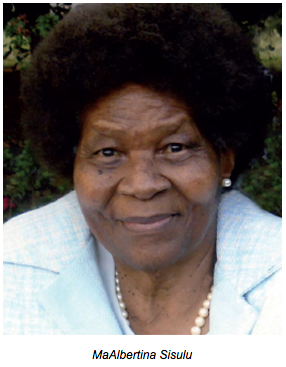 Sisulu, who was also described as a mother of the nation, was affectionately known as MaSisulu. Leading from the front, she dedicated her life to the struggle for the liberation of her people and did so by displaying discipline, honesty, dedication and humility.
Sisulu, who was also described as a mother of the nation, was affectionately known as MaSisulu. Leading from the front, she dedicated her life to the struggle for the liberation of her people and did so by displaying discipline, honesty, dedication and humility.
During her lifetime she endured decades of mistreatment at the hands of the apartheid government, including police harassment, detention, banning orders, the imprisonment of her equally renowned and charismatic husband, Walter, and the exile of her children.
Official funeral
Mourners from all sectors of society, including President Jacob Zuma, ANC struggle veteran Winnie Madikizela Mandela, Gauteng Premier Nomvula Mokonyane, Minister in the Presidency Collins Chabane, foreign dignitaries, former presidents and heads of government and religious leaders joined scores of people who attended her memorial service at the Orlando Stadium in Soweto. Many from the nursing profession also came to pay their last respects to MaSisulu, who spent most of her life as a health professional.
MaSisulu was honoured with an official funeral, with her coffin wrapped in the South African flag and the military saluting her.
Outstanding Leadership
In his tribute, President Zuma said MaSisulu would be remembered for her outstanding leadership and unifying spirit. “We are paying tribute today not only to the wife of our leader, Isithwalandwe Walter Sisulu; she was a leader in her own right.”
When the ANC spoke of the organisation’s selfless struggle, MaSisulu’s name stood out as a shining example, said the President. He added that many senior ANC leaders in government, politics and business had matured under her guidance, care and love. “She was their mother and their pillar of strength..”
Very few people have served their country and people with the same dedication, commitment, sacrifice, loyalty, respect, selflessness and patriotism as Mama Sisulu and few can hope to attract such an outpouring of love nationwide, the President said.
Max Sisulu, MaSisulu’s eldest son and Speaker of the National Assembly, said his mother had a way of making all her children feel special. “She was a mother, a political mentor to many activists. During her lifetime, Mama touched and shaped many lives beyond the ANC.,” he said.
Pillar of strength
Former President Nelson Mandela described MaSisulu as his pillar of strength during apartheid. “It is difficult and saddening to see you go my sister, you are more than a comrade; you are part of my being. Instead of me comforting your children, they had to comfort me over the last couple of days. Much has been said about your life and work. You are indeed one of the greatest South Africans, you right earned to be the mother of all our people."
MaSisulu is survived by seven children. She was laid to rest next to her husband, ANC leader Walter Sisulu, at Croesus cemetery in Johannesburg.
Through her marriage to Walter Sisulu, MaSisulu became politically active in her own right, attending with him the founding discussions of the Youth League. They were married in July 1944, and settled in the cinder block house in Orlando, Soweto, which would be their home for 45 years.
MaSisulu also played a leading role in the historic Women’s March to the Union Buildings in 1956 when 20 000 women protested against the oppressive pass laws.
During the period 1979 to 1981, she recruited a group of young women and directed them to revive the Federation of South African Women.
In 1994 she was elected to South Africa’s first democratic Parliament, where she served until retiring four years later. She was a deputy president of the ANC Women’s League, nurse and midwife, and took part in the formation of the United Democratic Front and the launch of the Freedom Charter.
Curbing violence through sport
Curbing violence through sport sadminSport and Recreation
The Sport and Recreation Department aims to use sport, particularly football, to teach life skills to young people and also to help prevent violence and HIV and AIDS. The Department has partnered with the German Government on a programme called Youth Development Against Violence Through Sport (YDVS).
 The main goal of the programme is to contribute to the prevention of violence and HIV-AIDS in South Africa.
The main goal of the programme is to contribute to the prevention of violence and HIV-AIDS in South Africa.
The programme will target girls and boys of school-going age (up to 18, and in some cases up to 20 years of age) living in disadvantaged urban and rural communities.
European Union
The Sport and Recreation Department will be working with municipalities all over the country through the Cooperative Governance and Traditional Affairs Department.
The German government donated about R15 million. Municipalities that have the powers and functions regarding local sport facilities will be given grants from this donation.
Sport and Recreation Minister Fikile Mbalula said the German funding showed that the development of sport and recreation in South Africa did not rely on taxpayer funding.
Mbalula said his department would maintain and strengthen its relations with the European Union (EU) and the German Government.
As a result of these relations, said Mbalula, the Department will receive a total amount of more than R62 million during this financial year. The money will be used for Youth Development through Football and the YSDV.
Minister Mbalula said the absence of sport and recreation facilities in some South African schools and communities could no longer be tolerated.
He added that the department had to break the backlog in sporting infrastructure particularly in disadvantaged communities.
Reviving school sport
The Minister said his department started talks with the Department of Human Settlement, as well as the Department of Cooperative Governance to redirect Municipal Infrastructure Grant (MIG) funds to Sport and Recreation to help fund sport and recreation facilities at schools and communities.
“In addition, we are finalising a working agreement with the Department of Basic Education as our immediate task to revive school sport, particularly in rural areas and townships,” he said.
“We believe the future of our youth lies in positioning schools as nurseries for talented and professional sportspersons.”
For more information, call Sport and Recreation South Africa: 012 304 5000
Make every day a Mandela Day
Make every day a Mandela Day sadminCelebrating Madiba
Every year on 18 July – Nelson Mandela’s birthday – South Africa and the rest of the world join hands to celebrate International Mandela Day.
The Mandela Day message for 2011 is centred around “change”. It is a call to action for people everywhere to take responsibility for making the world a better place, one small step at a time, just as Madiba did. Nelson Mandela spent 67 years of his life serving his community, the country and the world at large in the struggle for peace and equality.
To celebrate his life and the values he embraces, International Mandela Day was launched in 2009. It encourages people to do something good, no matter how big or small for 67 minutes on this day.
Mandela Mondays
In addition to Mandela Day, Mandela Mondays was started on 1 June 2011 to encourage people to make time in their schedules to do good deeds every day, even if it’s just for a few minutes. The Nelson Mandela Foundation has come up with this idea as a way to realise its ideal of making “every day a Mandela day”.
Last year, millions of people worldwide jumped on board to honour and celebrate Mandela’s legacy. Many supported their local charities, built homes in their communities, donated food and clothes to disadvantaged communities or offered their services at hospitals, children’s homes and old age homes.
How will you spend your 67 minutes of service this year? There are many ways to get involved. Here are just a few suggestions.
- Create food parcels and give them to people in need, like street children.
- Volunteer to do shopping for an elderly or disabled person.
- Volunteer at your local police station or faith-based organisation.
- Offer your help at a local children’s home or an old-age home.
- Offer to look after the children of a single mother to give her a break or take the children on an outing.
- Mow someone’s lawn or help them to fix things around the garden or house.
- Read to someone who can’t read.
- Collect unused clothing and blankets from friends and donate them to homeless people.
- Collect old newspapers from a school, community centre or hospital and take them to a recycling centre.
- Visit someone in hospital
Scripting the future of SA theatre
Scripting the future of SA theatre sadminSport & Recreation
A playwriting programme aimed at producing South African playwrights for the future has been started to encourage talented young people with an interest in this field. The programme is a partnership between the Department of Arts and Culture, Wits University, the British Council and Sustained Theatre (UK).
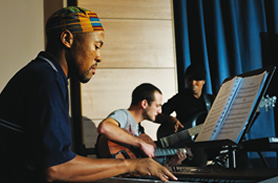 Through the New Plays Writing Programme, the Department of Arts and Culture aims to discover new talent and open doors for many people who want to pursue playwrighting as a career. The programme was started to encourage interest in playwriting as this is an area that has been neglected in the arts sector.
Through the New Plays Writing Programme, the Department of Arts and Culture aims to discover new talent and open doors for many people who want to pursue playwrighting as a career. The programme was started to encourage interest in playwriting as this is an area that has been neglected in the arts sector.
"The programme will provide young playwrights with skills that will allow them to build sustainable livelihoods for themselves," said Arts and Culture Minister, Paul Mashatile, at the programme launch in Johannesburg.
The South African New Plays Writing Programme will give a new generation of South African playwrights the necessary tools to develop plays for theatre. These should reflect the kind of society that South Africa is and the one that government wants to build.
World stages
“We are confident that this programme will produce new writers of the same talent as seasoned playwrights such as Todd Matshikiza, Barney Simon, and John Kani, to name a few,” said Minister Mashatile. The programme will assist the Arts and Culture Department to develop new playwrights whose productions will hopefully feature on major world stages, ensuring that South African stories were told to a wider and larger audiences.
Skills development
The department has a detailed plan on how to increase the arts, culture and heritage sector’s contribution to economic growth and job creation in line with the New Growth Path’s goal of job creation. This includes the establishment of a National Skills Academy for the Arts.
The academy will become a centre of excellence to train the best of the best that our country can offer.
New ideas
Minister Mashatile said at the height of apartheid, many activists wrote and performed poetry and drama at their homes, in community halls, in schools and in churches. “We must now use playwriting and theatre as part of our weapon in the battle against the socio economic challenges of our country. It is for this reason that we emphasize that initiatives such as the SA New Plays Writing Programme must create opportunities for sustainable livelihoods especially for our young people.”
The playwright programme will include the sharing of new ideas and will exchange programmes between South African and British playwrights.
